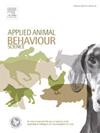并非人人平等:公众对不同宠物物种的认知能力、痛苦和情感依恋的看法
IF 2.2
2区 农林科学
Q1 AGRICULTURE, DAIRY & ANIMAL SCIENCE
引用次数: 0
摘要
在人类与动物的长期关系中,人类对不同物种的感知和互动方式一直存在差异。有一种假设认为,我们对动物智力和情感的认知与随后的圈养照料之间存在联系。因此,本研究旨在调查公众对属于不同动物类别的宠物的认知能力和情感能力的看法,并调查公众对动物认知能力的看法与他们对动物受苦能力和与主人建立联系能力的看法之间是否存在联系。结果显示,公众对动物认知能力和对主人情感依恋的看法遵循系统发育尺度。与其他动物类别相比,哺乳动物的得分最高,而且一般来说,在所有认知问题上,所有动物类别的得分都有显著差异。我们的研究结果还表明,尽管哺乳动物和鸟类的得分高于其他动物类别,但痛苦在动物类别中得到了普遍认可。此外,我们还发现,当受试者对动物的认知能力给予较高评价时,他们也认为该动物有更强的受苦能力和与主人形成强烈情感依恋的能力。这项研究结果表明,公众并不认为不同种类的宠物在认知能力或情感方面是等同的,而且那些被认为认知能力更强的动物种类也被认为更容易遭受痛苦。因此,在系统发育上与人类更为不同的宠物可能比那些关系更为密切的宠物福利更差。本文章由计算机程序翻译,如有差异,请以英文原文为准。
All is not equal: Public perception of cognitive abilities, suffering and emotional attachment in different pet species
In the longstanding relationship that humans have shared with animals, differences have consistently existed in the way that humans perceive and interact with different species. It has been hypothesised that there is a link between our perception of animal intelligence and emotions and subsequent care in captivity. Therefore, this study aimed to investigate public perception of the cognitive and emotional capabilities of pets belonging to different animal classes and investigate if there is a link between public perception of an animal’s cognition and their perception of its ability to suffer and create a bond with its owners. The results revealed that the public perception of an animal’s cognitive abilities and emotional attachment to their owners followed the phylogenetic scale. Mammals received the highest scores compared to other animal classes and, generally, there was a significant difference between the scores assigned to all animal classes across all cognitive questions. Our findings also indicate that suffering is universally recognized across animal classes, though higher scores were assigned to Mammals and Birds than the other classes. Moreover, we found that when participants rated an animal's cognitive abilities highly, they also believed that animal had a greater capacity to both suffer and to form strong emotional attachments to their owner. The results of this study reveal that the general public do not consider different pet species to be cognitively or emotionally equivalent across classes, and that those species of animal judged to be more cognitively capable are considered more susceptible to suffering. As a result, pet animals which are more phylogenetically distinct from humans may have poorer welfare than those more closely related.
求助全文
通过发布文献求助,成功后即可免费获取论文全文。
去求助
来源期刊

Applied Animal Behaviour Science
农林科学-行为科学
CiteScore
4.40
自引率
21.70%
发文量
191
审稿时长
18.1 weeks
期刊介绍:
This journal publishes relevant information on the behaviour of domesticated and utilized animals.
Topics covered include:
-Behaviour of farm, zoo and laboratory animals in relation to animal management and welfare
-Behaviour of companion animals in relation to behavioural problems, for example, in relation to the training of dogs for different purposes, in relation to behavioural problems
-Studies of the behaviour of wild animals when these studies are relevant from an applied perspective, for example in relation to wildlife management, pest management or nature conservation
-Methodological studies within relevant fields
The principal subjects are farm, companion and laboratory animals, including, of course, poultry. The journal also deals with the following animal subjects:
-Those involved in any farming system, e.g. deer, rabbits and fur-bearing animals
-Those in ANY form of confinement, e.g. zoos, safari parks and other forms of display
-Feral animals, and any animal species which impinge on farming operations, e.g. as causes of loss or damage
-Species used for hunting, recreation etc. may also be considered as acceptable subjects in some instances
-Laboratory animals, if the material relates to their behavioural requirements
 求助内容:
求助内容: 应助结果提醒方式:
应助结果提醒方式:


